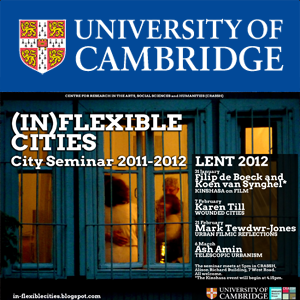City Seminar - 18 May 2015 - Welfare, Neighbourhood and New Geographies of Diversity
Duration: 1 hour 13 mins
Share this media item:
Embed this media item:
Embed this media item:
About this item

| Description: |
Welfare, neighbourhood and new geographies of diversity: rethinking the ethnography of super-diversity at the margins of the city
Mette Louise Berg & Ben Gidley (Oxford) Abstract: This paper presents an experimental collaborative ethnography in progress, based in Elephant and Castle, a central but marginal area of London. While most of the research conducted as part of the recent “convivial turn” in urban studies focuses on public and parochial spaces, our ethnography attempts to excavate quotidian practices of intercultural translation that occur in the hidden micropublics which are shaped by encounters between diverse residents and the welfare state. The ethnography reveals how, as axes of difference proliferate among residents in a super-diverse area, some differences make more of a difference, suggesting a need for more intersectional (rather than additive) understandings of diversity, and foregrounding the workings of inequality and class in structuring the right to the city. |
|---|
| Created: | 2015-06-16 10:28 |
|---|---|
| Collection: | City Seminar |
| Publisher: | University of Cambridge |
| Copyright: | Glenn Jobson |
| Language: | eng (English) |
| Distribution: |
World
|
| Keywords: | Mette Louise Berg; Ben Gidley; CRASSH; City Seminar; |
| Explicit content: | No |
| Abstract: | Welfare, neighbourhood and new geographies of diversity: rethinking the ethnography of super-diversity at the margins of the city
Mette Louise Berg & Ben Gidley (Oxford) Abstract: This paper presents an experimental collaborative ethnography in progress, based in Elephant and Castle, a central but marginal area of London. While most of the research conducted as part of the recent “convivial turn” in urban studies focuses on public and parochial spaces, our ethnography attempts to excavate quotidian practices of intercultural translation that occur in the hidden micropublics which are shaped by encounters between diverse residents and the welfare state. The ethnography reveals how, as axes of difference proliferate among residents in a super-diverse area, some differences make more of a difference, suggesting a need for more intersectional (rather than additive) understandings of diversity, and foregrounding the workings of inequality and class in structuring the right to the city. |
|---|---|

